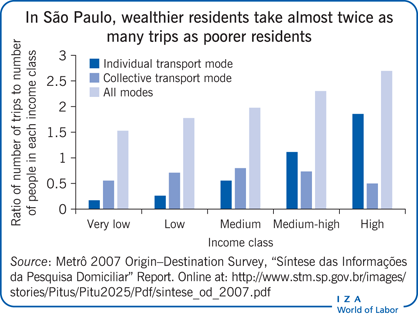Elevator pitch
Public transport infrastructure has not kept up with the demands of growing populations in cities in developing countries. Infrastructure provision has historically been biased against less affluent areas, so access to formal jobs is often difficult and costly for a large part of the lower-income population. As a result, low-income workers may be discouraged from commuting to formal jobs, lack information on job opportunities, and face discrimination. Through these channels, constrained accessibility can result in higher rates of job informality. Reducing informality can be a target for well-designed transport policies.

Key findings
Pros
Improvements in accessibility to public transport can lead to lower rates of informal employment.
The availability of more and better public transport can increase access to information about job opportunities available to workers.
Lower public transport costs can encourage lower-income workers to switch from home-based informal occupations to formal jobs, which are often concentrated in central areas.
Lower commuting costs can have a positive impact on formal job creation through their effect on formal wages.
Cons
Transport subsidies may have different effects on unemployed and informal workers, especially where informal employment offers an attractive alternative to formal employment.
The channels through which constrained accessibility may result in higher informality are not yet fully identified.
The design of appropriate transport policies requires more information on the commuting choices of informal workers.
The effect of increased transport accessibility on job choices must be evaluated as part of the socio-economic impact of transport projects.